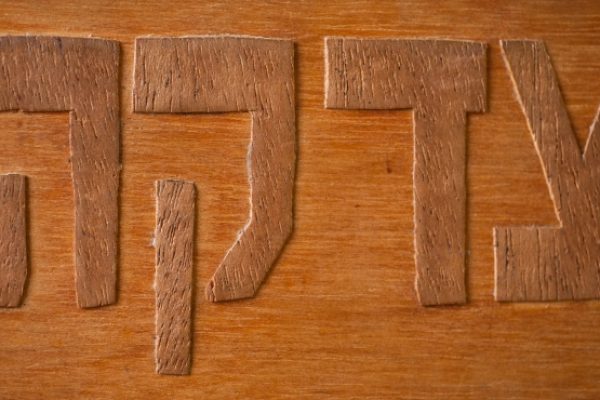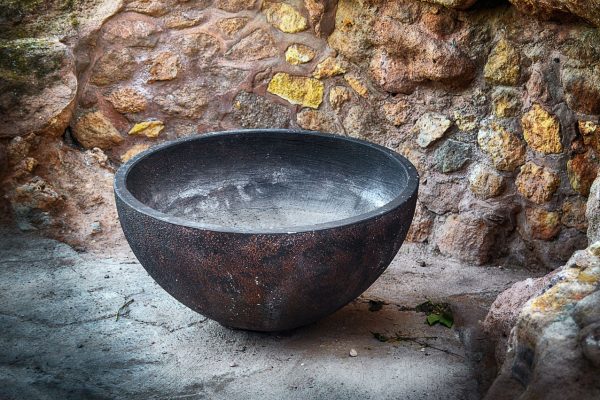“How can we tell where one person ends and another begins? The material finitude of our bodies is evident, but the borders of the soul are less definite. We merge as we learn from one another, live together and accrue common experiences, take on each other’s projects, and enter into shared fates. Love blurs the boundaries between one soul and another. In fact, love might be defined as that very erosion, absorption, commingling.
When the tenuous coupling of a person’s body and soul is undone by death, the bond of body and soul within each person who has been close to the one who has died is also weakened. The breath of God within all who were bound up with that person wishes, as it were, to leave the bodies of its temporary residence and to flee to the one great Source. And so it is that a survivor must mourn, to heal and repair the bond between his or her own body and soul – literally, in some measure, to stay alive.
There is a time when everything is changing, when a person is especially vulnerable, almost as though his or her skin were missing. Then the community comes together, the tradition steps in, and together we walk the person through the time of transition to a new place in a world reconnected.
Mourning is the ultimate disconnected state. Outside us, the web of life has been torn. Within us, body and soul are wrestling apart. Our tradition recognizes that, while body and soul may have been severed almost instantaneously for the loved one who died, the reweaving of body and soul in the survivors – the agenda of mourning – happens in stages over weeks, months, years, and generations to come.”
—Rabbi Margaret Holub, Lifecycles, Volume 1: Jewish Women on Life Passages and Personal Milestones (Jewish Lights), edited by Rabbi Debra Orenstein.
… it could all go in a minute. It WILL all go in a minute.
This life is a brief stop, whether I die tomorrow or in fifty years.
I would love not to know this, to have the innocent certainty that,
when loved ones set out on a journey, they will return unharmed,
that I can go out to sea in my boat, play in the waves and not be swallowed up.
But I am more grateful now than I ever was in my innocence.
In the end it is all a gift, is it not? The brief entwinement of body and soul,
the breath of God that gives and sustains human life,
creates such a colorful, sparkling trail as it arcs through time.
It is so ephemeral, and yet it affects everything.
As we say when we open our eyes every morning:
“modeh ani l’fanekha – I give thanks to you, God of life which is eternal,
for returning my soul to me this morning.
Great is your faithfulness.”
Bereyshit 35.19-21 Rachel died, and was buried in the way to Efrat, which is Beyt-Lekhem. Jacob set a pillar upon her grave; that is the pillar of Rachel’s grave to this day. And Israel journeyed on.
| Psalm 143 – A Psalm of David
Hear my prayer, O God, |
Mourner reads; witnesses answer AMEN. מִזְמוֹר, לְדָוִד
יְהוָה, שְׁמַע תְּפִלָּתִי– הַאֲזִינָה אֶל-תַּחֲנוּנַי
בֶּאֱמֻנָתְךָ עֲנֵנִי, בְּצִדְקָתֶךָ
וְאַל-תָּבוֹא בְמִשְׁפָּט, אֶת-עַבְדֶּךָ
כִּי לֹא-יִצְדַּק לְפָנֶיךָ כָל-חָי
כִּי רָדַף אוֹיֵב, נַפְשִׁי– דִּכָּא לָאָרֶץ, חַיָּתִי
הוֹשִׁבַנִי בְמַחֲשַׁכִּים, כְּמֵתֵי עוֹלָם
וַתִּתְעַטֵּף עָלַי רוּחִי; בְּתוֹכִי, יִשְׁתּוֹמֵם לִבִּי
זָכַרְתִּי יָמִים, מִקֶּדֶם– הָגִיתִי בְכָל-פָּעֳלֶךָ
בְּמַעֲשֵׂה יָדֶיךָ אֲשׂוֹחֵחַ
פֵּרַשְׂתִּי יָדַי אֵלֶיךָ; נַפְשִׁי, כְּאֶרֶץ-עֲיֵפָה לְךָ סֶלָה
מַהֵר עֲנֵנִי, יְהוָה– כָּלְתָה רוּחִי
אַל-תַּסְתֵּר פָּנֶיךָ מִמֶּנִּי; וְנִמְשַׁלְתִּי, עִם-יֹרְדֵי בוֹר
הַשְׁמִיעֵנִי בַבֹּקֶר, חַסְדֶּךָ– כִּי-בְךָ בָטָחְתִּי
הוֹדִיעֵנִי, דֶּרֶךְ-זוּ אֵלֵךְ– כִּי-אֵלֶיךָ, נָשָׂאתִי נַפְשִׁי
הַצִּילֵנִי מֵאֹיְבַי יְהוָה– אֵלֶיךָ כִסִּתִי
לַמְּדֵנִי, לַעֲשׂוֹת רְצוֹנֶךָ– כִּי-אַתָּה אֱלוֹהָי
רוּחֲךָ טוֹבָה; תַּנְחֵנִי, בְּאֶרֶץ מִישׁוֹר
לְמַעַן-שִׁמְךָ יְהוָה תְּחַיֵּנִי; בְּצִדְקָתְךָ, תּוֹצִיא מִצָּרָה נַפְשִׁי
וּבְחַסְדְּךָ, תַּצְמִית אֹיְבָי: וְהַאֲבַדְתָּ, כָּל-צֹרְרֵי נַפְשִׁי–כִּי, אֲנִי עַבְדֶּךָ
|
|---|
בָּרוּךְ דַּיָּן הָאֱמֶת
Barukh Dayan haEmet, Blessed is the True Judge.
If I can let you go as trees let go
Their leaves, so casually, one by one;
If I can come to know what they do know,
That fall is the release, the consummation,
Then fear of time and the uncertain fruit
Would not distemper the great lucid skies
This strangest autumn, mellow and acute.
If I can take the dark with open eyes
And call it seasonal, not harsh or strange
(for love itself may need a time of sleep),
and, treelike, stand unmoved before the change,
lose what I lose to keep what I can keep,
the strong root still alive under the snow,
love will endure – if I can let you go.
Rabbi
Talmud, Bava Batra 10a: It has been taught: R. Judah says: Great is tzedakah, in that it brings the redemption nearer, as it says, Thus says God, judge fairly and practice righteous justice [tzedakah], for redemption is not far from you, and the meaning of tzedakah will be revealed.
Witnesses
Ten strong things have been created in the world.
The rock is hard, but the iron cleaves it.
The iron is hard, but the fire softens it.
The fire is hard, but the water quenches it.
The water is strong, but the clouds bear it.
The clouds are strong, but the wind (ruakh) scatters them.
The wind is strong, but the body bears it.
The body is strong, but fright crushes it.
Fright is strong, but wine banishes it.
Wine is strong, but sleep works it off.
Death is stronger than all,
and tzedakah saves from death, as it is written,
justice [tzedakah] delivers from death.
Mourner:
May this tzedakah, this act of justice done in memory of ________________, save her from the death of forgetfulness, and keep her safe in the eternity of memory.
Wedding ring is removed. It or its value equivalent is donated to a mitzvah organization.
Bereyshit 32.25-32 Jacob was left alone; and there wrestled a being with him until the break of day. And when the saw that he prevailed not against him, he touched the hollow of his thigh; and the hollow of Jacob’s thigh was wounded as he wrestled with the other. And the other said, “Let me go, for the day breaks”. And he said, “I will not let you go, except you bless me”. The other said to him, “What is your name?” And he said, “Jacob”. And the other said, “Your name shall be called no more Jacob, but Israel; for as a prince you have power with God and with human beings, and have prevailed”. And Jacob asked him, and said, “Tell me, I beg you, your name.” And he said, “Why is it that you ask after my name?” And he blessed him there. Jacob called the name of the place Peniel. for I have seen God face to face, and my life is preserved. And as he passed through Peniel the sun rose upon him, and he limped upon his thigh.
Bereyshit 9.17 God said to Noah, This is the sign of the covenant, which I have established between me and all flesh that is upon the earth.
Mourner recites together with witnesses:
Blessed is God who remembers the Covenant and its promise.
Rabbi:
The time will come
when, with elation
you will greet yourself arriving
at your own door, in your own mirror,
and each will smile at the other’s welcome,
and say, sit here. Eat.
You will love again
the stranger who was yourself
Give wine. Give bread. Give back your heart
to itself, to the stranger who has loved you
all your life, whom you ignored
for another, who knows you by heart.
Take down the love letters from the bookshelf,
the photographs, the desperate notes,
peel your own image from the mirror.
Sit. Feast on your life.
Mourner:
בָּרוּךְ אַתָּה אֲדֹנָי אֱלֹהֵינוּ מֶלֶךְ הָעוֹלָם מְחַדֵּשׁ כָּל יוֹם מַעֲשֶׂה בְּרֵאשִׁית
Barukh atah Adonay Eloheynu melekh ha’olam m’khadeysh kol yom ma’aseh bereyshit.
Conclude with the sanctification of God over bread and wine.
***
This Ritual For Letting Go uses the basic psychological construct of past – present – future in the Jewish idiom, i.e. creation – revelation – redemption. It also seeks to incorporate traditional ways of honoring the memory of the dead through study. Thus it includes passages from Torah and Talmud, as well as berakhot and poetry designed to enhance the relevance of ancient passages.
The ritual offers potential for a variety of transitional expressions. Will one take on an additional name, as Jacob was given? Will there be some other form of demonstrable change in one’s life that will be recognized in these moments? This ritual might be most effective when the mourner feels a need to mark a readiness to move on.
It may be useful to pause after the Peniel text to consider the qualities of a name and how it expresses one’s sense of self – and how that sense of self changes as a result of experience, and of struggle. Perhaps different aspects of the meaning of one’s name become more pronounced at different times in one’s life. For example: When Naomi made her way back to Beyt-Lekhem after losing her husband and sons, she changed her name to Marah, “bitter”. Or consider the name Joseph, which is associated with the mystical sefirah Yesod: human reflections of God’s image in this sefirah include our capacity for tzedakah – justice, establishing a secure sense of foundation on which to build, the mutual commitment of the covenant, and the creative power of generativity and that which is passed from generation to generation.
Because of this ritual’s character of mourning turning toward hope, during the sefirat ha’omer it can be done on any day except Shabbat and Lag BaOmer; if during Sefirat haOmer, the sefirotic mix which is associated with that day’s count may offer interpretive possibilities.
Most rituals are performed with a minyan, or at least with two witnesses. The mourner’s comfort level with the involvement of the community is paramount; if the mourner does not feel that s/he wants to gather friends or family for this moment, the community’s presence is nevertheless invoked through the act of tzedakah. Thus the ritual is designed in such a way that it can be performed alone, or with a rabbi, witnesses, or a minyan or more.
B’shem omro [references]:
“How can we tell…” The Metaphysics of Mourning, adapted, cited in Lifecycles
“If I can let you go”, May Sarton, Sonnet 2 from “The Autumn Sonnets”
“The time will come,” Derek Walcott “Love After Love”












